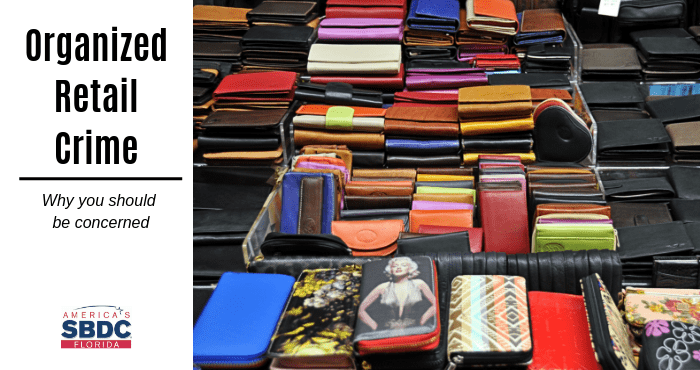Organized Retail Crime: What It Is and Why You Should Be Concerned
by Bill Burnham | February 22, 2019
Almost everyone is familiar with the term shoplifting. According to the National Association for Shoplifting Prevention (NASP), “there are approximately 27 million shoplifters (or 1 in 11 people) in our nation today, and more than 10 million people have been caught shoplifting in the last five years.” So, certainly anyone who owns a retail business is aware and many may already have systems set in place in order to minimize the risk.
The NASP reports that in most cases shoplifters are stealing product for their own use, but three percent of shoplifters make it a profession. Organized retail crime takes shoplifting to a whole new level where organized groups steal merchandise for the purpose of reselling it online or at flea markets. In addition, they may return the stolen merchandise to stores in exchange for store credit, which could be used to buy more desirable merchandise or to simply pocket the money.
According to the annual Organized Retail Crime survey conducted by the National Retail Federation, organized retail crime costs the retail industry $30 billion per year. This is a staggering number and is continually growing. According to the survey, 83 percent of merchants surveyed reported an increase in the past year. Ninety percent of those retailers who responded to the survey, have been a victim of organized retail crime in the past 12 months.
With those kind of statistics, organized retail crime is not just a problem for the large retail chains. In many cases, the small retailers are an easier target for criminals.
Though potential product lines can include almost anything, targeted products almost always share some or all of the following key characteristics:
- The product is considered valuable or in high demand.
- The product is easily accessible to consumers.
- The product is easily concealed to avoid detection when stolen.
- The product has wide availability and demand, especially in different stores or markets.
- The product is innovative or offers premium performance that is highly attractive to customers.
- The product is easily sold and converted to cash quickly.
So what can the small retailer, who cannot afford the elaborate and expensive theft protection systems, do to minimize the risk of becoming a victim of organized retail crime?
Being aware of the problem is the first step in prevention. There are also five inexpensive steps that can be taken to discourage organized theft groups.
Product placement – Move target products away from the door. Limit the quantity of items kept on the shelf and consider keeping them in locked display cases.
Key Control – Many organized retail crime groups depend on the assistance of employees inside the company. Limit access to keys and change locks anytime an employee with key access leaves the company.
Video Surveillance – Having a video surveillance system can be invaluable in stopping thieves. Systems have become relatively inexpensive and provide both deterrence and evidence should a theft occur.
Customer Service – Engaging with customers while in your store will lessen the likelihood of theft. Thieves want to get in and out quickly and unnoticed. If you have a reputation for strong customer service, they may just opt to pass you by.
Develop Partnerships – Working together with law enforcement and other retailers in order to share information will raise awareness and will allow all of the store owners to put deterrents in place before they become victims.
Retail crime can take a big bite out of a small business owner’s bottom line. When in doubt, enlist no-cost local resources to help you through the process of putting deterrents in place, such as the professionally credentialed consultants at the Florida SBDC at USF.






Bill Burnham
Burnham, Consultants, Growth Acceleration Consultants, Hernando, TampaFlorida SBDC at USF, Tampa
Specialty: Accounting, Business Planning, Business Valuation, Cash Flow Management, Financial Management, Growth, QuickBooks
Bill Burnham is a lifelong resident of the Tampa Bay area. He is a graduate of the University of South Florida where he majored in accounting. He obtained his MBA from Florida Institute of Technology. Burnham has more than 25 years of experience working with Fortune 500 companies, nearly 20 of those years in management positions. During that time he managed more than 200 employees and spent time in accounting, finance, manufacturing, production control and strategic planning. He managed government contract budgets in excess of $50 million dollars and operating budgets of more than $25 million dollars. He prepared analysis for potential acquisitions, proposals for government contracts and conducted company-wide training programs on several different topics. Complementing his large company background, Burnham also has 15 years of experience as a small business owner in industries as diverse as dry cleaning and home health care. In addition to those endeavors he has also worked as a business broker and business valuator performing valuations and selling business throughout the state of Florida. He has hands on knowledge in business planning, budgeting, forecasting, profit and loss management, cash management, business sales, business valuation and franchise operations. Burnham is also a Certified LivePlan Expert Advisor, QuickBooks Online ProAdvisor, Strategic Management Performance Systems certified, and a Profit Mastery Facilitator. Burnham was the 2018 Consultant of the Year for the Florida SBDC at USF region.